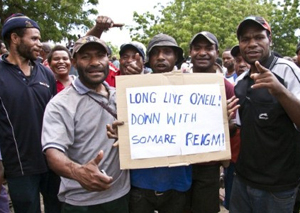
Hamish MacDonald
PORT MORESBY (Sydney Morning Herald / Pacific Media Watch): On the Kokoda Track, about the point where General Tomitaro Horii's invasion force was halted in September 1942 in sight of the Coral Sea, a mobile phone will now pick up the signal from the Port Moresby network.
As Papua New Guinea started voting yesterday in its national elections, after much worry about whether they would be held within the constitutional timeframe or even run in a meaningful way, many political players and analysts are watching to see how the mobile phone is changing the game.
The last elections took place in 2007, the same year the government deregulated telecommunications and removed the monopoly of the state telecom agency.
Two mobile phone companies, Digicel and BeMobile, jumped into the market, and their networks have since expanded to cover 75 per cent of the nearly 7 million population.
One study a year ago put mobile phone penetration at 48 percent of the population.
See full article under Special Reports
PMC's Henry Yamo on mobile phones and health research project in Papua New Guinea
This work is licensed under a Creative Commons Attribution-NonCommercial 3.0 New Zealand Licence.




